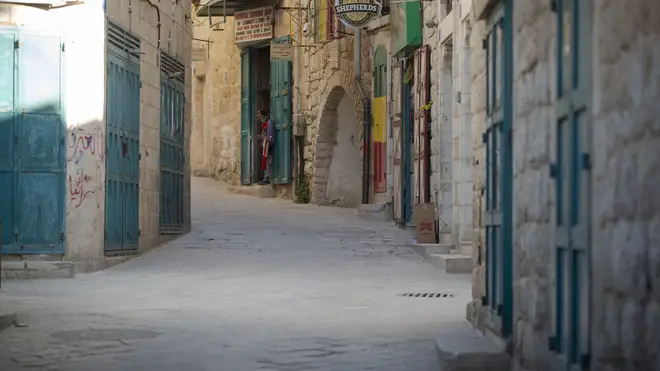
Tonight with Andrew Marr 6pm - 7pm
1 December 2020, 07:24

Missing are the thousands of international pilgrims who normally descend upon the town.
Coronavirus has cast a pall over nativity celebrations in Bethlehem, all but shutting down the biblical town revered as the birthplace of Jesus, at the height of the Christmas season.
Missing are the thousands of international pilgrims who normally descend upon the town.
Restaurants, hotels and souvenir shops are closed. The renowned Christmas tree lighting service limited to a small group of authorised people, as will church services on Christmas Eve.

“Bethlehem is dead,” said Maryana al-Arja, owner of the 120-room Angel Hotel on the outskirts of Bethlehem.
The hotel was the site of the West Bank’s first coronavirus outbreak, when a group of Greek tourists came down with the virus last March.
She kept on her 25 workers for several months, but ultimately could not continue to pay them.
Ms Al-Arja, who herself was infected with the virus, said she has been forced to close the hotel and lay off the entire staff because there is no sign of the pandemic ending or tourists visiting any time soon.
“We had 351 tourist groups booked in our hotel this year, each one 150 people,” she said. “But they all cancelled.”

Elyas al-Arja, the head of the city’s hotel association, said Bethlehem received some three million tourists in 2019.
With Israel, the main entry point for international visitors to the region, banning tourists because of the coronavirus crisis, and the West Bank’s border crossing with Jordan closed to foreigners, that number is close to zero this year, he said.
“Sixty per cent of the city relies on tourism, and their income disappeared when the tourists disappeared,” said Mr al-Arja, a cousin of the Angel Hotel owner.
The Ambassador Hotel, near the Church of the Nativity, built on the site where Christians believe Jesus was born, has reopened one floor in the hope that some local visitors may want to celebrate in the coming weeks.
Mahmoud Tarman, the hotel’s receptionist, said the Ambassador has brought back eight of its 60 workers to serve local guests. But with the West Bank’s economy devastated by repeated lockdowns, it remains unclear how many people will come.

“At this time of the year, this empty hotel would be bustling with life. But as you see, there is no life, not even a Christmas tree yet,” he said as he pointed at the empty lobby.
The Palestinian Authority, which administers parts of the Israeli-occupied West Bank, this week imposed a new night time lockdown to help contain a spike in coronavirus cases.
People must remain indoors from 7pm until 6am, and Bethlehem is included in the lockdown.
Officials say the lockdown could be extended through Christmas and into the new year if the infection levels do not come down.
The health ministry has reported a total of about 65,000 coronavirus cases in the West Bank, and more than 620 deaths.

Bethlehem’s mayor, Anton Salman, said the city had planned to receive 3,000 invited guests, including local scout troops and musical bands from around the world that normally entertain visitors during Christmas Eve festivities.
He said the famed Christmas tree lighting, scheduled for Thursday, will be limited to just 15 guests, including local mayors, the district governor and the Latin Patriarch and other clergy.
The 85-year-old Palestinian president, Mahmoud Abbas, who usually joins the celebration, has been invited but has not said whether he will attend.
Midnight Mass, a solemn event led by the Latin Patriarch that is usually attended by religious leaders, local VIPs and hundreds of pilgrims from around the world, has also been scaled back, Mr Salman said.
He said officials are still working on the guest list, but it is expected to include religious leaders and some foreign diplomats. The event will be closed to the general public but broadcast live for people to watch.
“No-one can hold the responsibility of inviting large numbers of people to Christmas events,” he said. “Nothing will be the same during the pandemic.”